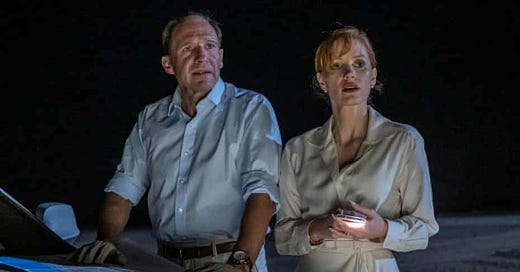The Forgiven
This dark and contemplative drama stars Ralph Fiennes and Jessica Chastain as an unhappy married couple whose desert excursion turns into life-and-death intrigue.
“The Forgiven” is not the sort of movie to give comforting answers, but raise prickly questions. It plays out in a way that is humanistic and authentic but leaves everyone unhappy.
Ralph Fiennes and Jessica Chastain play a miserable well-to-do couple making a trip to the remote Moroccan desert for a lavish party being put on by a friend. But they wind up killing a teen Arab boy in a careless car accident, upturning their entire lives and that of his family.
These are both very specific, nuanced performances from a pair of Oscar winners in their best form. David Henninger (Fiennes) is a British physician, late middle age, a self-acknowledged high-functioning alcoholic who has seen whatever dreams and ideals he had in life chewed up and spat out. Most everything out of his mouth these days is an acerbic observation or dismissive barb. He seems to live to nettle others.
“The world is a dreadful place, my father used to say, and the best you can do is make fun of it,” David says to justify his dark humors.
Jo Henninger (Chastain) is some years younger, a children’s book author who hasn’t written anything for years. She has slowly absorbed and begun to replicate David’s poisonous attitude. With her razor’s edge jawline and luminously pale skin, Chastain seems like a wandering spirit searching for a home to haunt.
The Henningers don’t so much fight as constantly rub up against each other, like two different sorts of materials that can only coexist through friction.
As the story opens they are traveling through the north African Sahara for an ostentatious multiple day to-do put on by David’s friend, Richard Galloway (Matt Smith). You may ask why a wealthy Brit would have a compound in the middle of the arid nothingness as a getaway place, and people do.
Richard seems to have some genuine attraction to the culture and speaks the language. He’s also gay and clearly enjoys lording his infidel status over his Muslim servants, and displaying his boy toy of a partner, Dally (Caleb Landry Jones), who dresses like a Ken doll being played with by girls who like to swap in some of Barbie’s accessories.
“I’ve been an accessory for a long time now,” is how Jo describes her marriage. She shares an immediate attraction with Tom (Christopher Abbott), another American at the party, and their escalating game of cat-and-mouse flirtations seem destined to arrive at the expected place.
Driving drunk along roads that are little more than trails in the sand, David and Joe are arguing when the boy, Driss, suddenly appears in front of them and is run over and killed. It seems he was trying to sell the trilobyte fossils the locals hawk to rich tourists. But he and his friend also are shown to have a gun with them, possibly to encourage negotiations in a more lucrative direction.
The couple arrive at the party late in the late with the body in the back seat. Everyone’s minds turn immediately to protecting the Westerners. The police are called and encouraged, possibly with some bribery, to declare the death an accident. But then a man claiming to be Driss’ father, Abdellah Taheri (Ismael Kanater), shows up to claim the body.
It seems a familiar scenario will play out with money exchanging hands to compensate for the death, with the implicit understanding that things will get worse for David if he doesn’t go along. But Abdellah has a strange request, insisting that David accompany him to his distant village of Tafal’aalt for the burial. It’s their custom, he insists.
David agrees, at Richard’s urging, as a way to cool rising tensions. But terrorist elements are known to operate in the area. It’s possible Abdellah himself is not the simple goat farmer he appears to be, despite his protestations that he only wants to do the honorable thing.
It’s a giant leap of faith for someone like David, who’s used to paying off debts for his regular infractions against others. This time, though, the price may be something he has to grow within the emptiness inside himself in order to offer it to another.
Saïd Taghmaoui plays Anouar, Abdellah’s right-hand man, who begins to develop a friendly — or at least less overtly adversarial — relationship with David while is in their custody, essentially as a willing prisoner. He believes strongly in his culture and traditions, but like any man wishes for something better.
As the movie cuts back and forth between David’s trip and the ongoing party, the former seems to grow more poignant and starkly beautiful while the latter reveals itself in all its ostentatious ugliness and squalid uselessness. We are disgusted by these rich layabouts who seem to do nothing but drink, dance and insult each other. Later a minor lord shows up with a gaggle of perilously young arm candy — shades of Prince Andrew.
The indulgences of the idle rich have never seemed more repulsive.
“The Forgiven” isn’t for everyone. Written and directed by John Michael McDonagh from the novel by Lawrence Osborne, it’s a deliberately dour piece about people with hardened shells finally forced to take a look inside themselves and examine the rot growing there.
Despite the title, it’s not a tale of redemption but forced reflection and self-judgment. The Henningers would have been content to spin away the rest of their lives in drink and growing discontent. It took a killing to make them face the unforgiving mirror.





